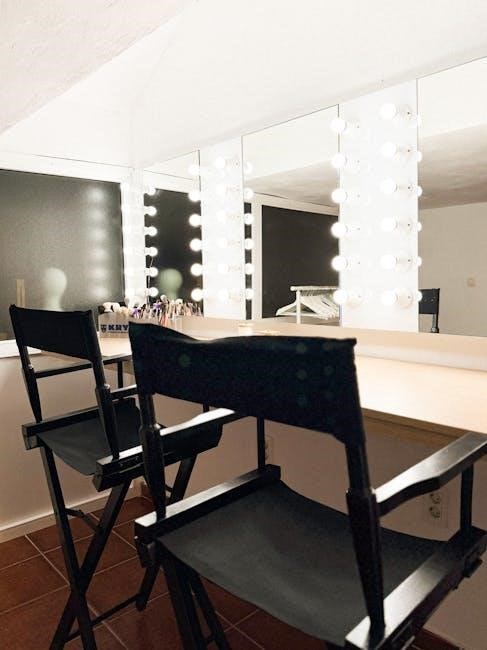A Sola Salon Lease Agreement outlines the terms and conditions for renting a salon suite, ensuring clarity on responsibilities, rent, and lease duration for salon professionals.
1.1 What is a Sola Salon Lease Agreement?
A Sola Salon Lease Agreement is a legally binding contract between a salon professional and a Sola Salon Studios location. It outlines the terms for renting a salon suite, including lease duration, rent, responsibilities, and benefits. This agreement provides independence for professionals while ensuring clarity on operational expectations and financial obligations, making it a cornerstone for a successful salon suite rental experience.
1.2 Importance of Understanding the Lease Agreement
Understanding the Sola Salon Lease Agreement is crucial for salon professionals to avoid unforeseen financial or legal issues. It ensures clarity on rent, terms, and responsibilities, protecting both parties. Misunderstandings can lead to disputes, so thorough comprehension is vital for a smooth and successful rental experience, empowering professionals to make informed decisions and operate confidently within the agreement’s framework.

Key Components of a Sola Salon Lease Agreement
The agreement includes lease duration, rent calculation, payment terms, tenant responsibilities, and termination clauses, ensuring a clear understanding of obligations and expectations for salon suite rentals.
2.1 Lease Duration and Renewal Terms
A Sola Salon Lease Agreement typically outlines a fixed lease duration, often ranging from one to three years, with specific renewal terms. Tenants must understand the conditions for extending their lease, including notice periods and potential rent adjustments. Clarifying these terms ensures a smooth transition and avoids unexpected issues, making it essential to review renewal clauses carefully before signing the agreement.
2.2 Rent Calculation and Payment Terms
Rent for a Sola Salon suite is typically calculated based on the size and location of the space, with terms outlined in the lease agreement. Payments are usually monthly or weekly, depending on the arrangement. Salon professionals should review the payment schedule, accepted methods, and any late fees to ensure timely payments and avoid penalties, maintaining a positive relationship with the landlord.
2.3 Responsibilities of the Salon Owner and Tenant
The salon owner is responsible for maintaining the property, utilities, and common areas, while tenants must uphold their suite’s condition, adhere to safety standards, and manage client interactions. Both parties should communicate regarding repairs, lease compliance, and any issues to ensure smooth operations, fostering a professional and mutually beneficial relationship throughout the lease term.

The Process of Renting a Sola Salon Suite
Renting a Sola Salon Suite involves verifying eligibility, submitting an application, reviewing the lease, signing the agreement, and preparing your space for client services.
3.1 Eligibility Criteria for Renting a Salon Suite
Renting a Sola Salon Suite requires meeting specific criteria, such as having an active client base, valid licenses, proper insurance, and acceptable credit history. Prospective tenants must also demonstrate financial stability and professionalism. Sola Salon Studios may require proof of experience and a formal application process to ensure suitability for their rental agreements.
3.2 Step-by-Step Guide to Signing the Lease
To sign a Sola Salon lease, review the agreement thoroughly, ensuring understanding of terms, rent, and duration. Secure necessary insurance, pay the security deposit, and complete a walk-through of the suite. Review the lease legally, ask questions, and ensure all details align with your business needs before signing. Once satisfied, execute the agreement and begin setting up your salon space.

Pros and Cons of a Sola Salon Lease Agreement
A Sola Salon Lease offers flexibility and autonomy for professionals but may involve financial risks and long-term commitments. Careful review of terms is essential for informed decisions.
4.1 Benefits for Independent Salon Professionals
Independent salon professionals benefit from autonomy, flexible lease terms, and access to prime locations. Sola Salon Lease Agreements often include utilities, maintenance, and marketing support, reducing overhead costs. Professionals can focus on building their client base and brand without the burdens of traditional salon ownership, making it an attractive option for those seeking entrepreneurial freedom and financial stability in the beauty industry.
4.2 Potential Drawbacks to Consider
While beneficial, Sola Salon Lease Agreements may have drawbacks. Higher rental costs, strict termination policies, and potential financial penalties for early cancellation can strain budgets. Additionally, lease terms may not be as flexible as needed, and salon professionals must handle certain responsibilities independently, which can be challenging for new entrepreneurs seeking stability in the competitive beauty industry.

Understanding Lease Terms and Conditions
Reviewing the lease terms and conditions is crucial for salon professionals to understand their obligations, including rent, duration, and termination policies, ensuring informed decisions.
5.1 What to Look for in the Fine Print
When reviewing the Sola Salon Lease Agreement, pay attention to clauses regarding rent increases, termination penalties, maintenance responsibilities, and any hidden fees. Ensure all terms align with your business goals and financial capacity. Understanding these details helps prevent unexpected costs and ensures a smooth operation of your salon suite. Prioritize clarity on all obligations.
5.2 Negotiating Favorable Terms
Negotiating a Sola Salon Lease Agreement requires understanding your needs and the market standards. Clearly communicate your expectations to the landlord, focusing on rent, lease duration, and responsibilities. Prioritize terms that benefit your business long-term, such as flexible renewal options or caps on rent increases. Seeking legal advice can also help ensure the agreement is fair and transparent, protecting your interests.

Termination and Cancellation Policies
Termination and cancellation policies in a Sola Salon Lease Agreement outline the procedures for ending the lease, including penalties and required notice periods, ensuring clarity for both parties.
6.1 How to Terminate a Sola Salon Lease
Terminating a Sola Salon Lease involves reviewing the agreement for specific clauses, providing written notice within the required timeframe, and understanding potential penalties. Salon professionals must follow formal procedures to avoid disputes, ensuring compliance with the lease terms. Consulting with legal counsel is recommended to navigate the process smoothly and understand any financial obligations.
6.2 Consequences of Early Cancellation
Early cancellation of a Sola Salon Lease may result in financial penalties, loss of security deposits, or legal action. Salon professionals could face additional fees for unpaid rent or damages. It’s crucial to review the lease agreement thoroughly to understand potential consequences before deciding to terminate the contract prematurely, ensuring informed decision-making to avoid financial repercussions.

Frequently Asked Questions (FAQs)
Discover common queries about Sola Salon Lease Agreements, covering lease terms, termination policies, and insights from experienced salon suite owners to address your concerns effectively;
7.1 Common Queries About Sola Salon Leases
Prospective tenants often ask about lease durations, rent structures, and termination policies. They also inquire about responsibilities, such as maintenance and utilities, and seek clarity on renewal terms. Additionally, questions arise about the process of signing the lease and the support provided by Sola Salon Suites. Understanding these aspects helps in making informed decisions.
7.2 Answers from Experienced Salon Suite Owners
Experienced owners emphasize understanding lease terms, including termination clauses and rent structures. They advise negotiating terms like utility responsibilities and maintenance costs. Many highlight the importance of having a clear business plan and client base before signing. They also recommend seeking legal advice to ensure lease agreements align with personal and professional goals.
Success Stories and Tips from Salon Professionals
Many salon professionals thriving in Sola Salon Suites highlight the freedom and flexibility offered by their lease agreements. Experienced owners share tips on effective business planning and budgeting to maximize profitability. Their insights provide valuable guidance for those considering a Sola Salon lease, emphasizing the importance of clear financial goals and client retention strategies.
8.1 Real-Life Experiences with Sola Salon Leases
Salon professionals share inspiring stories of growth and independence through Sola Salon leases. Many highlight the flexibility to customize their space and build a loyal client base. Some mention challenges, like initial setup costs, but overall, the leases are praised for fostering creativity and financial stability. These real-life experiences offer valuable insights for aspiring suite owners.
8.2 Best Practices for Managing Your Lease
Effectively managing a Sola Salon lease involves understanding terms, tracking expenses, and maintaining open communication with your landlord. Set aside funds for unexpected costs and plan for lease renewal or termination. Regularly review financials to ensure profitability and consider investing in insurance to protect your business. Clear communication and proactive planning are key to a successful and stress-free lease experience.
Understanding and managing a Sola Salon Lease Agreement is crucial for salon professionals to ensure a successful and profitable business venture in their chosen salon suite.
9.1 Final Thoughts on Sola Salon Lease Agreements
Final thoughts emphasize the importance of carefully reviewing and understanding the Sola Salon Lease Agreement to ensure a balanced and beneficial partnership, empowering salon professionals to thrive while managing responsibilities effectively.
9.2 Next Steps for Aspiring Salon Suite Owners
Aspiring salon suite owners should thoroughly research lease terms, seek legal advice, and budget for startup costs. Building a loyal client base and understanding financial obligations are crucial. Utilizing resources like checklists and guides can help streamline the process, ensuring a smooth transition to independence and long-term success in their salon suite venture.
